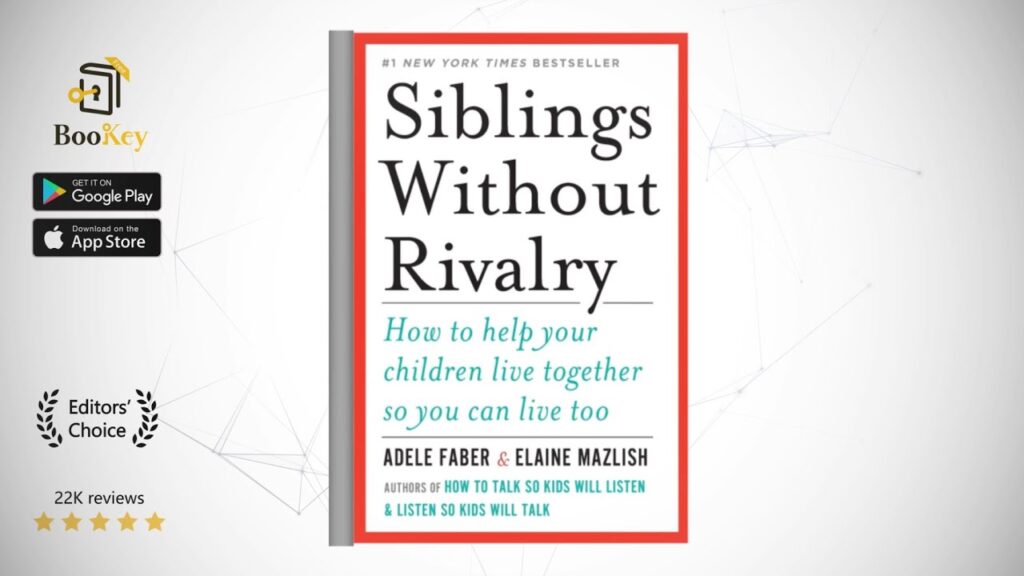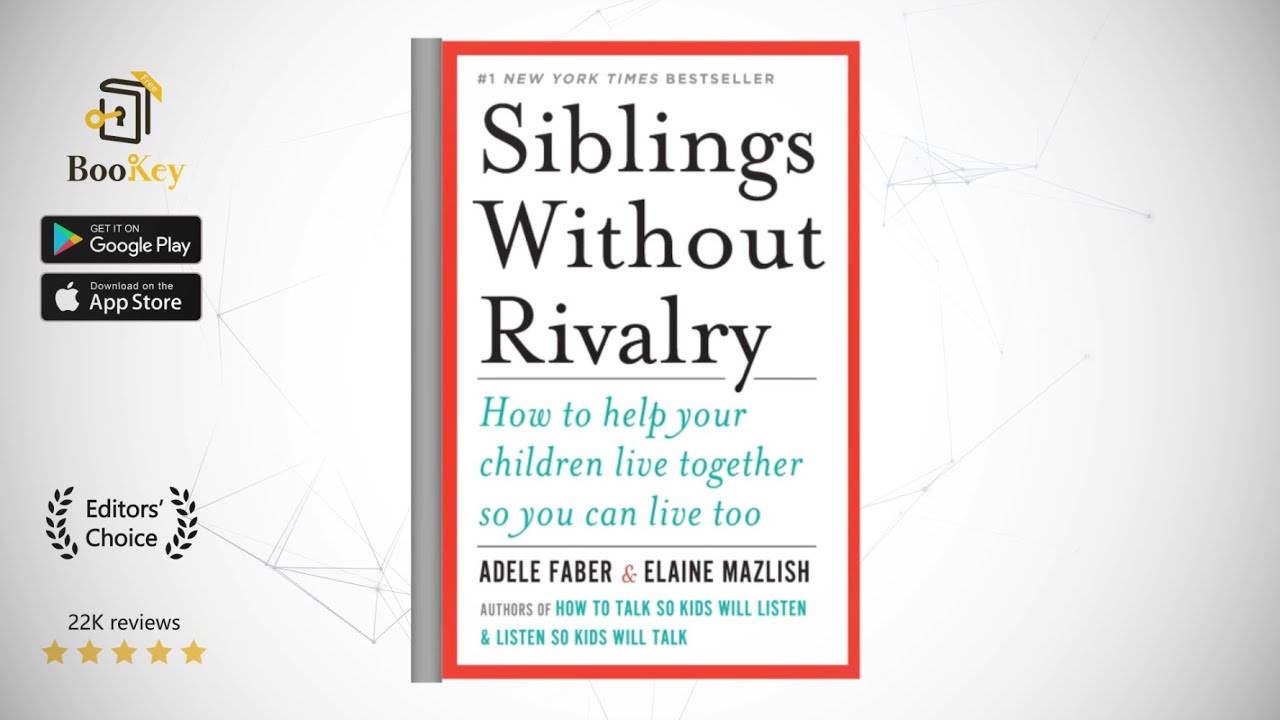
Sibling Without Rivalry: Fostering Harmony in Your Family
Sibling rivalry is a common challenge in many families. The constant bickering, competition, and jealousy can be incredibly stressful for parents and detrimental to the children’s relationships. However, it’s possible to navigate these challenges and foster a harmonious environment where siblings support and cherish each other. This article explores practical strategies for creating a family dynamic where sibling without rivalry thrives, leading to stronger bonds and a more peaceful home.
Understanding Sibling Rivalry
Before addressing the solutions, it’s crucial to understand the root causes of sibling rivalry. It’s rarely about one child being inherently ‘bad’ or ‘difficult.’ Instead, it often stems from:
- Competition for Parental Attention: Children naturally crave their parents’ love and approval. When they perceive that their sibling is receiving more attention, jealousy and resentment can arise.
- Differences in Temperament and Personality: Siblings are individuals with unique personalities, interests, and needs. These differences can lead to clashes and misunderstandings.
- Unequal Treatment (Perceived or Real): Even if parents strive for fairness, children may perceive that one sibling is favored over another. This can fuel resentment and competition.
- Life Changes and Stressors: Major life changes, such as a new baby, moving to a new house, or starting school, can disrupt the family dynamic and exacerbate sibling rivalry.
- Developmental Stages: Different developmental stages can contribute to conflict. For example, a toddler may not understand the concept of sharing, leading to frustration for an older sibling.
Strategies for Fostering Sibling Harmony
Creating a sibling without rivalry dynamic requires a multi-faceted approach that addresses the underlying causes and promotes positive interactions. Here are some effective strategies:
Embrace Individuality
Recognize and celebrate each child’s unique strengths, talents, and interests. Avoid comparing siblings to each other, as this can foster feelings of inadequacy and competition. Instead, focus on appreciating their individual qualities.
For example, if one child excels in sports and the other in art, provide opportunities for them to pursue their passions and celebrate their achievements separately. Avoid pushing them into activities they don’t enjoy simply because their sibling is successful in that area. Fostering individuality will help reduce the intensity of sibling without rivalry scenarios.
Avoid Favoritism
Strive to treat each child fairly, even if their needs and personalities differ. Be mindful of your words and actions to avoid inadvertently showing favoritism. This doesn’t mean treating all children exactly the same, but rather providing each child with the support and attention they need based on their individual circumstances. Make sure each child feels equally valued and loved.
If one child requires more attention due to a disability or medical condition, explain this to the other siblings in a way they can understand. Emphasize that love and affection are not finite resources and that you have enough for everyone.
Establish Clear Expectations and Rules
Establish clear and consistent rules for behavior and conflict resolution. Teach children how to communicate respectfully, share resources, and resolve disagreements peacefully. Enforce these rules consistently and fairly.
When conflicts arise, encourage children to express their feelings without resorting to name-calling or physical aggression. Help them identify the root cause of the conflict and brainstorm solutions together. [See also: Conflict Resolution Skills for Kids]
Create Individual Time with Each Child
Dedicate individual time to each child on a regular basis. This allows you to connect with them on a deeper level, understand their needs and concerns, and reinforce your love and appreciation. Even a short amount of dedicated time can make a big difference in reducing sibling rivalry.
This individual time doesn’t have to be elaborate or expensive. It could be as simple as reading a book together, playing a game, or going for a walk. The key is to be fully present and engaged with the child during that time.
Teach Empathy and Perspective-Taking
Help children develop empathy and the ability to see things from their sibling’s perspective. Encourage them to consider how their actions might affect their sibling’s feelings. This will help them develop a greater understanding and appreciation for each other.
When conflicts arise, ask each child to describe the situation from their sibling’s point of view. This can help them understand the other person’s perspective and find common ground. Teaching empathy is crucial in achieving a sibling without rivalry dynamic.
Promote Cooperation and Teamwork
Encourage siblings to work together on projects or activities that require cooperation and teamwork. This will help them develop communication skills, learn to compromise, and build a sense of camaraderie.
Assign household chores that require siblings to work together, such as setting the table or cleaning up after dinner. Or, encourage them to collaborate on creative projects, such as building a fort or writing a story together.
Avoid Comparing Siblings
One of the most damaging things parents can do is compare siblings to each other. This can create feelings of inadequacy, resentment, and competition. Instead, focus on celebrating each child’s unique strengths and talents.
Avoid phrases like, “Why can’t you be more like your brother?” or “Your sister is so much better at math than you are.” These types of comparisons are hurtful and unproductive. Instead, focus on providing each child with the support and encouragement they need to reach their full potential. Avoiding comparisons will significantly contribute to a sibling without rivalry environment.
Model Positive Sibling Relationships
Children learn by observing their parents’ behavior. Model positive sibling relationships by treating your own siblings with respect and affection. Share stories about your own positive sibling experiences and emphasize the importance of family bonds.
If you have a strained relationship with your own siblings, consider seeking therapy or counseling to improve your communication and resolve any underlying issues. This can have a positive impact on your children’s relationships as well.
Intervene Strategically in Conflicts
While it’s important to allow siblings to resolve their own conflicts, there are times when parental intervention is necessary. Step in when conflicts escalate into physical aggression, name-calling, or bullying.
When intervening, remain neutral and avoid taking sides. Focus on helping the children communicate their feelings respectfully and find a mutually agreeable solution. Teach them problem-solving skills they can use in future conflicts. Over-intervention can sometimes hinder the development of a sibling without rivalry state, so find a balance.
Seek Professional Help When Needed
If sibling rivalry is severe or persistent, consider seeking professional help from a therapist or counselor. A therapist can provide guidance and support to help families navigate these challenges and develop healthier communication patterns.
Therapy can be particularly helpful if there are underlying issues contributing to the conflict, such as anxiety, depression, or trauma. A therapist can also help parents develop more effective parenting strategies for managing sibling conflict.
The Long-Term Benefits of Sibling Harmony
Fostering a sibling without rivalry dynamic is an investment in your children’s future. Siblings who have a positive and supportive relationship are more likely to:
- Have higher self-esteem
- Develop strong social skills
- Experience greater emotional well-being
- Have a strong support system throughout their lives
Creating a harmonious family environment where siblings cherish and support each other is a challenging but rewarding endeavor. By understanding the root causes of sibling rivalry and implementing these strategies, you can foster a family dynamic where siblings thrive and build lasting bonds.
Ultimately, achieving a true sibling without rivalry situation requires patience, consistency, and a commitment to creating a loving and supportive family environment. The rewards, however, are well worth the effort.

